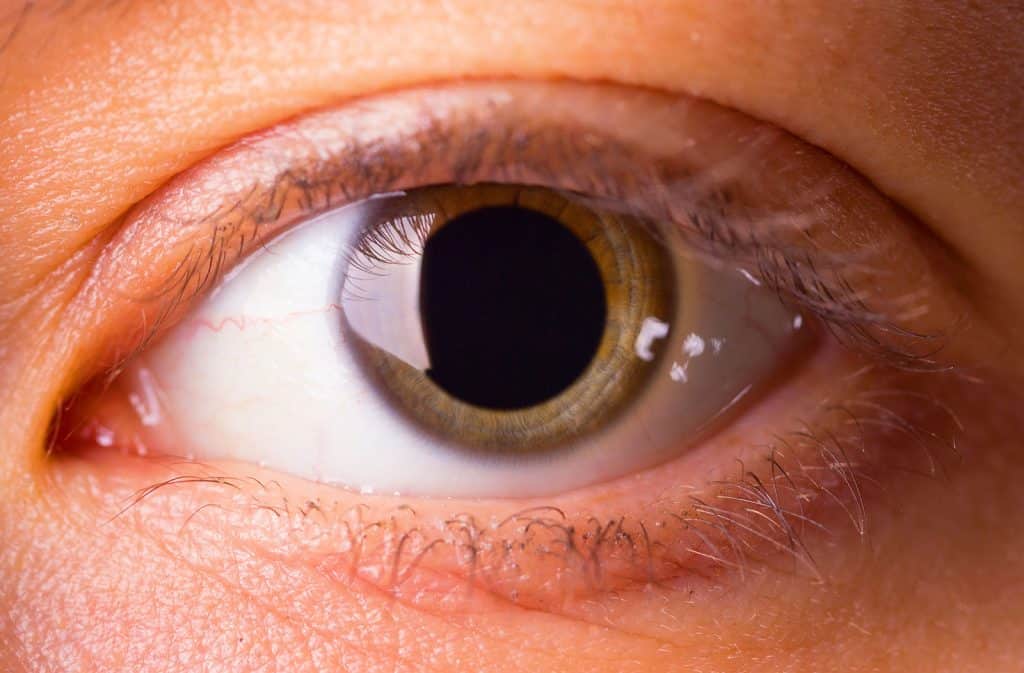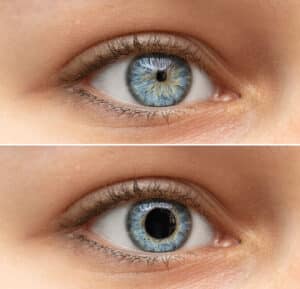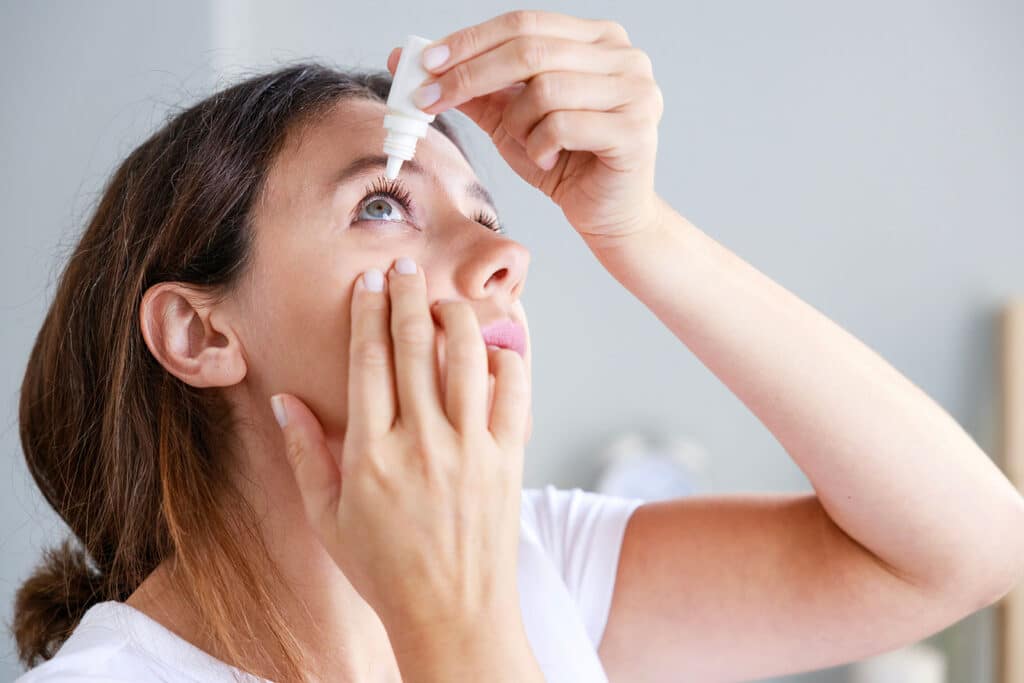What Prescribed and Nonprescribed Drugs Cause Dilated Pupils?
Dilated pupils, also known as mydriasis, are a common side effect of taking prescription and nonprescription medications. This is when the pupils expand in size, making the eyes appear darker than normal. In most cases, dilated pupils return to their normal size within 4 to 6 hours; however, this can vary greatly from person to person. Use this guide to learn more about dilated pupils, what causes them, and how to get rid of dilated pupils from Adderall or other drugs.

Table of Contents
- 1 What Causes Dilated Pupils?
- 2 What Prescription and Nonprescription Drugs Cause Pupils to Dilate?
- 3 What are Pinpoint Pupils?
- 4 Is It Possible to Get Permanent Pupil Dilation?
- 5 How to Get Rid of Dilated Pupils from Adderall and Other Drugs
- 6 How to Manage Dilated Pupils
- 7 Additional Signs of Prescription and Illegal Drug Abuse
- 8 When to Get Help
What Causes Dilated Pupils?
Pupils are designed to expand in low light, allowing people to see better at night. When it is brighter, the pupils naturally get smaller and the iris gets bigger, limiting the amount of light you see. While light is the most common reason why pupils dilate, it can also be caused by a chemical reaction in the brain. This chemical reaction usually stems from intense emotions, but several drugs can also cause this same reaction. This is an involuntary response and there is very little a person can do to control their pupils.
What Prescription and Nonprescription Drugs Cause Pupils to Dilate?
Dilated pupils are typically associated with stimulants and psychotropic substances, but there are several different drugs that cause dilated pupils. The most common reason medications affect your eyes is because they influence the brain’s neurotransmitters.

Here are some other common prescription medications that affect the eyes:
- Anticholinergics, typically used for overactive bladder and motion sickness treatment, may block the neurotransmitters associated with muscle contractions.
- Anticonvulsants and antiepileptics can influence the nerve impulses in the brain.
- Antidepressents influence both serotonin and norepinephrine levels, which in turn affect a range of functions.
- Antihistamines, or allergy medications, can block the chemicals that affect swelling, itchiness, and other common symptoms.
- Benzodiazepines, commonly used to treat anxiety or insomnia, can relax the muscles.
- Stimulants used to treat ADHD frequently cause pupil dilation.
Other prescription medications that can cause eye dilation include decongestants, dopamine precursors, mydriatics and eye drops, and selective serotonin reuptake inhibitors. Many prescription medications used in treating ADHD, anxiety, or depression can cause the eyes to dilate including Adderall and Ritalin.
Several illegal drugs also affect the brain’s neurotransmitters. One of the common signs of drug misuse is dilated pupils. Sometimes, dilated pupils from drug use can last for hours or longer than a day. Commonly misused drugs that affect the pupils include LSD, ecstasy, cocaine, crystal meth, heroin, ketamine, mescaline, bath salts, MDMA, and other stimulants.
Dilated pupils are especially common when people start taking new medications. If the medication was prescribed to you, dilated pupils may be a normal side effect and should go away on their own after a few hours. If you are concerned about how long your pupils have been dilated and you need assistance, contact a doctor right away.
What are Pinpoint Pupils?

Pinpoint pupils, or miosis, are a common side effect of taking opioids. This occurs when the pupils get less than two millimeters in size and stop responding to light. While this condition is most associated with opioids, sedatives, heroin, fentanyl, painkillers, PCP, and nicotine can cause pinpoint pupils. This could also indicate a more serious health issue or injury.
If you or someone you know has pinpoint pupils with no explanation, you should seek medical assistance. In some cases, smaller pupils can indicate a drug overdose or a severe medical illness.
Is It Possible to Get Permanent Pupil Dilation?
While most of the time pupils return to normal after a few hours, they can become permanently dilated, or fixed. A fixed dilated pupil can be the symptom of a brain injury or other trauma. Prolonged drug use can also cause permanently dilated pupils.
How to Get Rid of Dilated Pupils from Adderall and Other Drugs
While there are treatments available for pupil dilation, such as surgery or prescription medication, the recommended treatment will vary greatly depending on how the pupils became dilated. If the condition occurred from taking prescription or nonprescription medications, you may need to wait for all of the effects of the drug to leave your system. You would also need to avoid the drug in the future in order to keep your pupils functioning normally.
A medical detox can be a great way to get Adderall, opioids, or other drugs out of your system. This is because you may experience some systems of withdrawal, especially after heavy drug usage. Medical detoxes are supervised and can help give you peace of mind, especially if you are going through other physical or psychological symptoms of withdrawal. The goal isn’t just to get the drugs out of your system and get rid of dilated pupils; it is to help you take the first steps of recovery and create long-term sobriety.
How to Manage Dilated Pupils
In most cases, you will only be able to wait until your eyes return to normal. Taking care of your eyes during this time is very important to avoid damage. While caring for your eyes may not help you get rid of dilated pupils faster, they can make you feel much more comfortable and avoid some of the common side effects, such as headaches.

The first thing to do is to avoid sunlight. Normally, the pupils will get smaller in bright spaces to limit the amount of light your eyes take in. Sunlight can be especially dangerous with dilated pupils, as it can cause UV damage. Wearing sunglasses while outside or in bright spaces can help you avoid discomfort.
Another thing to avoid is bright screens. If you cannot limit your screen time, you may need to wear blue-light protection glasses or dim the brightness of the screen.
Pupil dilation can also cause blurry vision. Some additional side effects may include dizziness, headaches, and difficulty balancing. This will make it more difficult to read small text or focus on details. It is usually best to avoid driving or intense activities until your pupils return to their normal size.
If your eyes are dilated on a regular basis or for an extended period of time, you may also need to invest in special glasses to further protect your eyes. In some cases, a good pair of sunglasses may not be enough and you will need to see an optometrist.
Additional Signs of Prescription and Illegal Drug Abuse
While dilated pupils are one of the most noticeable signs of drug abuse, there are a few other symptoms you can look out for if you suspect a loved one might be at risk. Substance abuse can affect sleep, speech, and overall mood. If your loved one is experiencing heightened depression, paranoia, insomnia, or isolation, they could be battling an addiction. Other side effects may include unexplained changes in weight, trembling, or slurred speech.
When to Get Help
Knowing when to seek professional help is always important. If your eyes are consistently dilated or smaller than normal, you should seek medical attention. An eye specialist can help you to avoid further injury to the eyes and can help you understand your treatment options.
If your pupils are dilated due to prescription or nonprescription drug use, it could be a sign that it is time to enter a detox program. Garden State Detox has residential treatments, individual counseling, and medical detox programs to help you become sober. Contact us today to learn more about our personalized detox programs and how they can help you.

